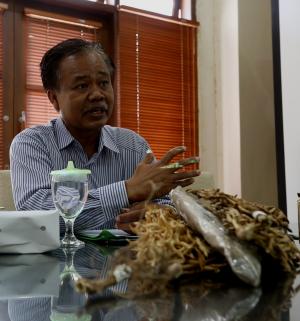One of IPB Professor Chair Holders: Skills and Human Resources are Important to Achieve Self-sufficiency in Soybeans

It is estimated that Indonesia will experience the shortage of 1.5 million tons of soybeans in the year 2018. The largest harvested area estimate of 1.67 million hectares in 1992, and yield is estimated at 1.12 tons per hectare. In 2013, the soybean harvested area was only 0:55 million hectares, and yield is estimated at 1.45 tons per hectare.
However, with increased population pressure, especially in the densely populated island of Java, the area of land for agriculture has decreased and cultivation has been forced to expand to marginal land outside Java. The current total tidal areas are approximately 20.1 million hectares in Indonesia, and approximately 9.53 million hectares out of them are potential for agriculture. Tidal land with higher potential for soybean planted area is 2.08 million hectares, while those with less potential for agriculture is 1.33 million hectares.
Professor chair holder of the Faculty of Agriculture of Bogor Agricultural University (FAPERTA IPB), Prof.Dr. Munif Ghulamahdi, successfully utilized tidal land in Sumatra, Kalimantan and Papua to produce soybeans. In his press conference of his pre-oration at Baranangsiang Campus, Bogor, on Thursday, 26 May 2016, Prof. Munif stated that by applying Budidaya Jenuh Air (BJA – growing media is saturated and soggy) technology, his team successfully produced four tons of soybeans per hectare in the tidal land.
The problems of soybean cultivation on tidal land are low in soil fertility and rich in Pyrite content. Pyrite oxidized will releasing high amounts of acidity cause the low pH of soil, and it causes the high solubility of the elements Fe, Al and Mn and the low availability of nutrients, especially P, yielding 800 kilograms per hectare with conventional technology using budidaya kering (BK – Dryland farming).
"Therefore, the high levels of heavy metals can only be dissolved in waters that have a low pH through BJA technology, and can artificially modify soil through the addition of fertilizer to promote vigorous growth and increase yield. I estimated that the application of such methods by farmers will enable to produce 60 percent of the recommended by research program. It means they will produce 2.4 tons per hectare, "he explained.
Accordingly, the increase in harvested areas of 625 thousand hectares of tidal areas and 312 500 tonnes soybean seeds will meet the shortage of supply of 1.5 million tons of soybeans in Indonesia.
According to him, to achieve self-sufficiency in soybeans areas with BJA method application should be needed. In addition three conditions namely: 1. The availability of seed and other production facilities; 2. Build the necessary institutions to ensure that key decisions; and 3. Trade, markets and support to farmers.
One of potential areas for agricultural expansion is swamp reclamation outside Java. Moreover, the availability of soybean seeds for tidal area are really needed. “Jabalsim” (Jalur benih antar lapang dan antar musim – Line of seeds between airy and between seasons) will utilized to select the appropriate soybean seeds. Furthermore, seed storage methods using plastic bags or cans will maintain seed moisture levels required for long-term seed storage. It is important to know the quality of the seed being planted. In most Indonesian province, the highest yields of soybeans are obtained from early plantings, generally in December to March in the drylands, and between May to August in tidal land. Seeds stored in plastic bags between September to December. The seed of soybeans is sown in April to August.
"Among all the farmers that we nurture, farmers in Jambi most rapidly adopting all the technologies that we teach. Human resources (HR) involvement is a critical success factor for food self-sufficiency. Therefore, there must be strong and transparent institutions, established by government, farmers' groups and the Agricultural Extension Workers (PPL). However, due to weaknesses of the frontline extension workers, they should be supported by university graduates, "he said (Wied)



